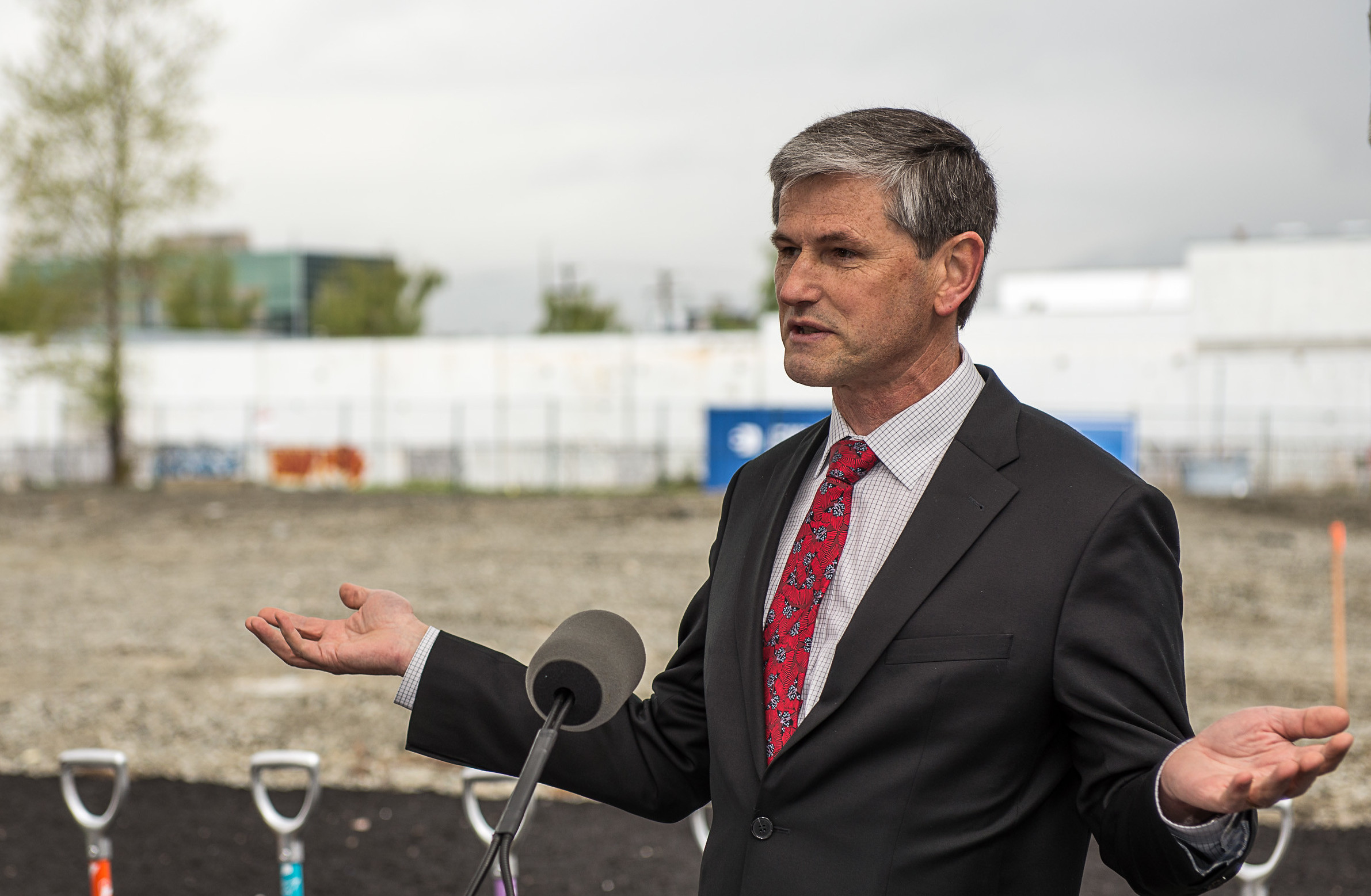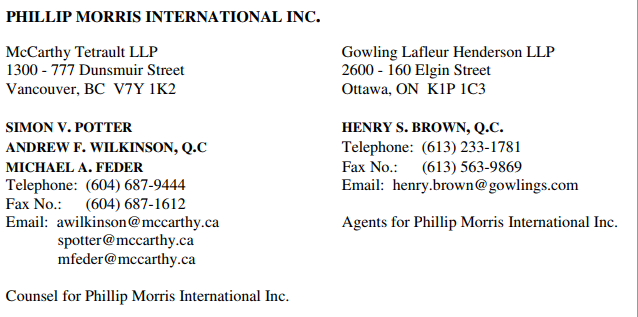BC Liberal leader went to bat for big tobacco, big pollution, and big corruption against British Columbians

BC Liberal leader Andrew Wilkinson is campaigning hard to become the Premier of British Columbia, but his resume shows that he went to bat for big tobacco, big pollution and big corruption against the very people hopes to lead.
Big Tobacco
Andrew Wilkinson represented Philip Morris International Inc., as it and other big tobacco companies dragged the Attorney General of BC through the court system[1]https://www.canlii.org/en/#search/text=S010421, fighting the Tobacco Damages and Health Care Costs Recovery Act[2]https://www.canlii.org/en/bc/laws/stat/sbc-2000-c-30/latest/sbc-2000-c-30.html, court records show[3]https://drive.google.com/file/d/1xNmjVe3cC208eWOkSpzXbCt0AlrRzRj9/view?usp=sharing.
Ironically, Wilkinson worked as a medical doctor before becoming a lawyer and has also served as the Attorney General of BC.
In a controversial legal maneuver, Wilkinson and other big tobacco lawyers brought a motion alleging that if the companies were found liable, they would be entitled to compensation from the Government of Canada for “negligent misrepresentation, negligent design, and failure to warn, as well as at equity.”[4]https://drive.google.com/file/d/1ap8dz-s3kGzi-I_tAg9FQqz6NpN1FaKw/view?usp=sharing
“Officials, at all material times, owed a duties of care to consumers, arising from their conduct in the development and implementation of operations programmes and initiatives respecting smoking and health, and in particular respecting tobacco related disease or the risk of tobacco related diseases,” the tobacco industry lawyers argued. “Officials assumed duties to consumers to make reasonable care in the development and implementation of those smoking and health programmes and initiatives.”
The Supreme Court of Canada subsequently dismissed the big tobacco’s action[5] R. v. Imperial Tobacco Canada Ltd., [2011] 3 SCR 45, 2011 SCC 42 (CanLII), (http://canlii.ca/t/fmhcz).
Big Pollution
Andrew Wilkinson also lobbied on behalf of a US company notorious for pollution, and the province ended up granting the energy company a hall pass to set up a facility in British Columbia bypassing provincial environmental laws.
Wilkinson first signed up as lobbyist for the New Jersey-based Covanta Energy Corporation on January 30, 2008 ‒ just over two years after he left his post as a deputy minister in the BC Liberal Government on January 6, 2006 ‒ according to an article appearing in the Public Eye magazine[6]http://www.publiceyeonline.com/archives/002879.html.
On August 5, 2009, the BC Environment Assessment Office granted Covanta Energy Corporation an exemption from obtaining an environment assessment certificate for the proposed Gold River Power Project, documents obtained by ThinkPol show[7]https://thinkpol.ca/wp-content/uploads/2018/02/28-bc-eao-2009-the-gold-river-power-project-order-under-section-101b-p-2.pdf.
“Major projects in B.C. are assessed for potentially significant adverse environmental, social, economic, health and heritage effects by the Environmental Assessment Office (the EAO), as required by the Environmental Assessment Act,” the Environment Assessment Office website states[8]http://www.eao.gov.bc.ca/process.html. “The company building the project (the proponent) provides details on what they believe to be the potential adverse effects of the project, and how they mitigate those effects.”
But the Environment Assessment Office granted Covanta the exemption even though multiple US jurisdictions had fined the energy company over egregious breaches of environmental regulations, including serious cases of air pollution caused by the company releasing toxic levels lead, dioxin/furan, nickel and other compounds in the atmosphere[9]http://www.durhamenvironmentwatch.org/Covanta/Covanta%20Fact%20Sheet.pdf.
Despite Covanta’s track record of environmental law violations, the Environment Assessment Office concluded that the “proposed Project will not have significant adverse environmental, economic, social, heritage or health effects, taking into account practical means of preventing or reducing to an acceptable level, any potential adverse effects of the proposed Project.”
Interestingly, while Wilkinson started lobbying for Covanta starting January 30, 2008, he did not register himself with the BC Lobby registry until two and a half years later on June 4, 2010[10]
https://justice.gov.bc.ca/lra/reporting/registrar/review.do?method=get®istrationId=1539602.
Big Corruption
Andrew Wilkinson also acted for corrupt Chinese tycoon Ni Ritao’s company Sun Wave Forest Products, which breached an agreement to resurrect an abandoned pulp mill costing the City of Prince Rupert millions of dollars.
An SCMP investigation into case revealed that the businessman lied to a Vancouver court about his convictions for graft and forgery, falsely claiming he had been fully exonerated[11]http://www.scmp.com/news/world/united-states-canada/article/2055167/exclusive-corrupt-chinese-tycoon-ni-ritao-linked.
Wilkinson acted as a lawyer on the matter until March 27, 2012, when Bill Belsey, the then vice-president of the B.C. Liberal Party, took over the case[12]https://www.theglobeandmail.com/news/british-columbia/new-bc-liberal-candidate-has-ties-to-shuttered-pulp-mill/article8798196/.
British Columbians appear to neither forgive nor forget Wilkinson’s role in the scandal.
Conrad Lewis, 56, remembers the broken promises of the Chinese firm that lined Wilkinson’s pockets.
“They had a sign on there for almost 20 years saying opening soon, but they never did,” he said, thinking about the disappearance of traditional industries he’s seen first hand in the Prince Rupert area. “It’s a frickin’ horror show.”
He’s worked in the fishing industry most of his life and has seen the world flip upside down.
“I never believed I’d see the day when fish would be exported,” he said, explaining raw fish exports mean fewer BC jobs. “It’s all being shipped out.”
In fact, he says, the word around town is that the only thing Sun Wave Forest Products was after was the dock access – so they could siphon more of BC’s resources (and jobs along with it) off to China.
References
| 1. | ↑ | https://www.canlii.org/en/#search/text=S010421 |
| 2. | ↑ | https://www.canlii.org/en/bc/laws/stat/sbc-2000-c-30/latest/sbc-2000-c-30.html |
| 3. | ↑ | https://drive.google.com/file/d/1xNmjVe3cC208eWOkSpzXbCt0AlrRzRj9/view?usp=sharing |
| 4. | ↑ | https://drive.google.com/file/d/1ap8dz-s3kGzi-I_tAg9FQqz6NpN1FaKw/view?usp=sharing |
| 5. | ↑ | R. v. Imperial Tobacco Canada Ltd., [2011] 3 SCR 45, 2011 SCC 42 (CanLII), (http://canlii.ca/t/fmhcz) |
| 6. | ↑ | http://www.publiceyeonline.com/archives/002879.html |
| 7. | ↑ | https://thinkpol.ca/wp-content/uploads/2018/02/28-bc-eao-2009-the-gold-river-power-project-order-under-section-101b-p-2.pdf |
| 8. | ↑ | http://www.eao.gov.bc.ca/process.html |
| 9. | ↑ | http://www.durhamenvironmentwatch.org/Covanta/Covanta%20Fact%20Sheet.pdf |
| 10. | ↑ | https://justice.gov.bc.ca/lra/reporting/registrar/review.do?method=get®istrationId=1539602 |
| 11. | ↑ | http://www.scmp.com/news/world/united-states-canada/article/2055167/exclusive-corrupt-chinese-tycoon-ni-ritao-linked |
| 12. | ↑ | https://www.theglobeandmail.com/news/british-columbia/new-bc-liberal-candidate-has-ties-to-shuttered-pulp-mill/article8798196/ |




